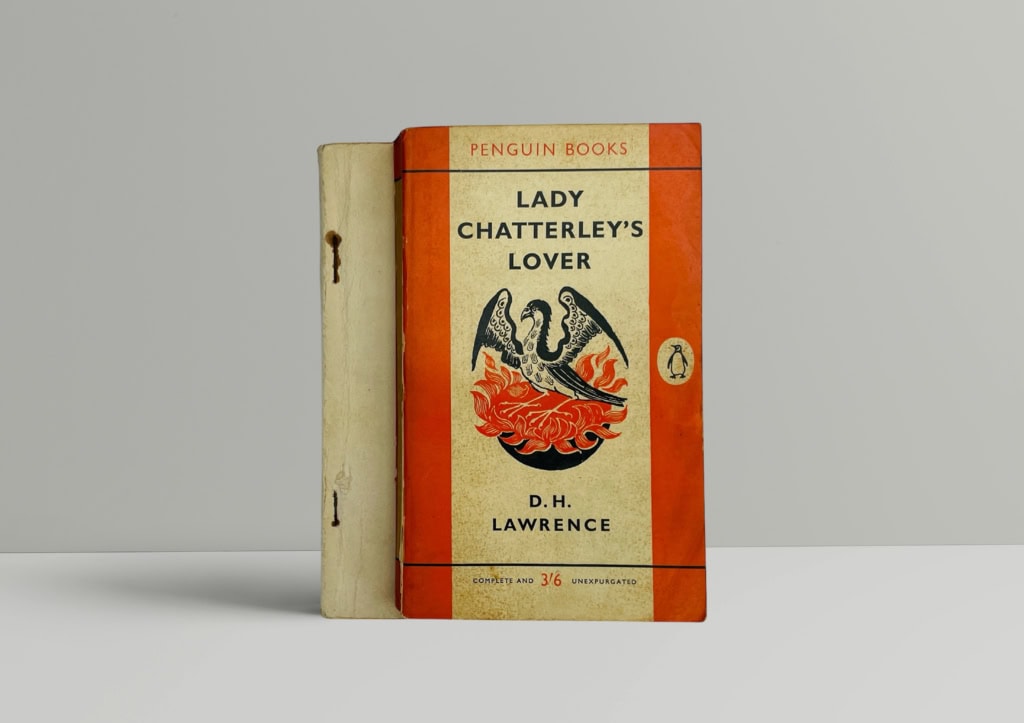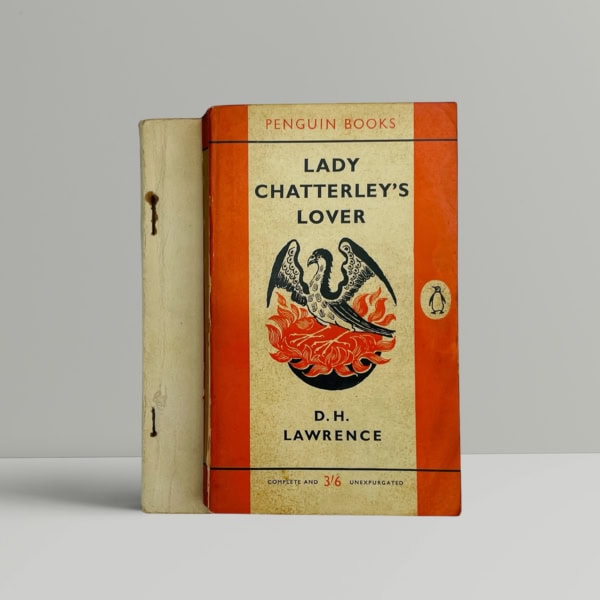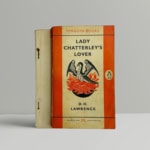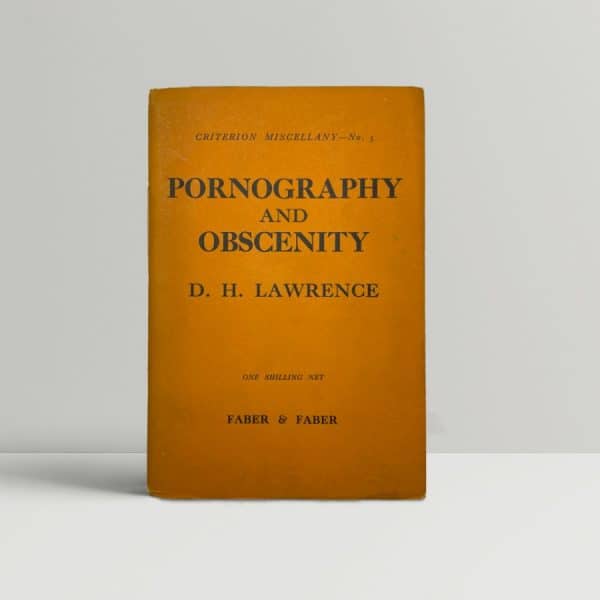D.H. Lawrence – Lady Chatterley’s Lover – Pre-publication Proof – Withdrawn by Hazell Watson and Viney
£12,500.00
A pre-publication ‘dummy’ or proof copy of Penguin’s unexpuragted version of ‘Lady Chatterley’s Lover’, printed before the landmark trial of Regina vs Penguin Books.
The proof, bound in buff coloured card with front and rear staples (a little stained) was printed (for Penguin) by Hazell Watson and Viney Ltd. The company later withdrew from printing the book as workers at Hazell Watson and Viney felt the book inappropriate and it was later printed by Western Printing Services.
Western Printing Services were responsible for the 200,000 copies of the first Penguin edition, printed prior to the outcome of the trial.
The 1960 trial of Regina v. Penguin Books Ltd over the publication of Lady Chatterley’s Lover by D.H. Lawrence marked a watershed moment in British literary, legal, and cultural history. It was the first major test of the Obscene Publications Act 1959, a law intended to protect the public from explicit material unless it could be shown to have redeeming literary or artistic value.
Lady Chatterley’s Lover, originally published privately in Italy in 1928, had long been banned in the United Kingdom due to its explicit depiction of sex and frequent use of then-taboo language. The novel centers on the passionate affair between Constance Chatterley, an upper-class woman, and Oliver Mellors, a working-class gamekeeper. It challenged social class boundaries and is notable for its frank portrayal of physical intimacy, especially from a female perspective.
In 1960, Penguin Books decided to publish an unexpurgated version of the novel. As part of its mission to make great literature available to the public at affordable prices, Penguin believed the book’s literary merit outweighed its controversial content. However, the British government quickly brought charges against the publisher under the new Obscene Publications Act. The trial began at the Old Bailey in London on October 20, 1960. The prosecution, led by Mervyn Griffith-Jones, argued that the novel was obscene and would corrupt readers, famously asking in his opening statement: “Is it a book that you would even wish your wife or your servants to read?” This outdated sentiment immediately alienated many observers and highlighted the generational and class divides at the heart of the case. Penguin’s defence, led by Gerald Gardiner QC (later Lord Chancellor), brought in an impressive list of expert witnesses, including academics, writers, clergy, and critics, who testified to the novel’s serious literary, moral, and social value. They argued that Lawrence’s use of explicit language was not pornographic, but integral to his message about emotional and physical connection, human dignity, and the dehumanising effects of industrial society.
After a six-day trial, the jury found Penguin Books not guilty. The verdict was a landmark victory for freedom of expression, effectively ending book censorship in the UK and opening the door for more open discussions of sexuality and class in literature. Penguin sold over 200,000 copies on the first day of release, with sales reaching millions soon after. Over just three months following the verdict, three million copies of Lady Chatterley’s Lover were sold, reportedly outselling the bible. Selfridges sold 250 copies in minutes. A spokesman told The Times newspaper: “It’s bedlam here. We could have sold 10,000 copies if we had had them.”The trial became symbolic of the liberalising cultural shifts of the 1960s, representing a victory not just for Penguin and literature, but for changing attitudes toward morality, authority, and individual freedom.
This proof copy, of which we can find one other copy in Bristol University along with the original Penguin edition used by Sir Lawrence Byrne, constitutes the first appearance in English of the unexpurgated version of the novel, meant for readers in 1928 by Lawrence and is of institutional importance. Accompanied by a first edition of the Penguin paperback printed by Western Printing Services. Presented in archival box and with a first edition of the transcripts from the trial with a foreward by Hyde.
(We don't keep all of our stock in the shop, so send us an email if you're planning a trip to see a particular author or book.)
- Description
Description
A pre-publication ‘dummy’ or proof copy of Penguin’s unexpuragted version of ‘Lady Chatterley’s Lover’, printed before the landmark trial of Regina vs Penguin Books.
The proof, bound in buff coloured card with front and rear staples (a little stained) was printed (for Penguin) by Hazell Watson and Viney Ltd. The company later withdrew from printing the book as workers at Hazell Watson and Viney felt the book inappropriate and it was later printed by Western Printing Services.
Western Printing Services were responsible for the 200,000 copies of the first Penguin edition, printed prior to the outcome of the trial.
The 1960 trial of Regina v. Penguin Books Ltd over the publication of Lady Chatterley’s Lover by D.H. Lawrence marked a watershed moment in British literary, legal, and cultural history. It was the first major test of the Obscene Publications Act 1959, a law intended to protect the public from explicit material unless it could be shown to have redeeming literary or artistic value.
Lady Chatterley’s Lover, originally published privately in Italy in 1928, had long been banned in the United Kingdom due to its explicit depiction of sex and frequent use of then-taboo language. The novel centers on the passionate affair between Constance Chatterley, an upper-class woman, and Oliver Mellors, a working-class gamekeeper. It challenged social class boundaries and is notable for its frank portrayal of physical intimacy, especially from a female perspective.
In 1960, Penguin Books decided to publish an unexpurgated version of the novel. As part of its mission to make great literature available to the public at affordable prices, Penguin believed the book’s literary merit outweighed its controversial content. However, the British government quickly brought charges against the publisher under the new Obscene Publications Act. The trial began at the Old Bailey in London on October 20, 1960. The prosecution, led by Mervyn Griffith-Jones, argued that the novel was obscene and would corrupt readers, famously asking in his opening statement: “Is it a book that you would even wish your wife or your servants to read?” This outdated sentiment immediately alienated many observers and highlighted the generational and class divides at the heart of the case. Penguin’s defence, led by Gerald Gardiner QC (later Lord Chancellor), brought in an impressive list of expert witnesses, including academics, writers, clergy, and critics, who testified to the novel’s serious literary, moral, and social value. They argued that Lawrence’s use of explicit language was not pornographic, but integral to his message about emotional and physical connection, human dignity, and the dehumanising effects of industrial society.
After a six-day trial, the jury found Penguin Books not guilty. The verdict was a landmark victory for freedom of expression, effectively ending book censorship in the UK and opening the door for more open discussions of sexuality and class in literature. Penguin sold over 200,000 copies on the first day of release, with sales reaching millions soon after. Over just three months following the verdict, three million copies of Lady Chatterley’s Lover were sold, reportedly outselling the bible. Selfridges sold 250 copies in minutes. A spokesman told The Times newspaper: “It’s bedlam here. We could have sold 10,000 copies if we had had them.”The trial became symbolic of the liberalising cultural shifts of the 1960s, representing a victory not just for Penguin and literature, but for changing attitudes toward morality, authority, and individual freedom.
This proof copy, of which we can find one other copy in Bristol University along with the original Penguin edition used by Sir Lawrence Byrne, constitutes the first appearance in English of the unexpurgated version of the novel, meant for readers in 1928 by Lawrence and is of institutional importance. Accompanied by a first edition of the Penguin paperback printed by Western Printing Services. Presented in archival box and with a first edition of the transcripts from the trial with a foreward by Hyde.





